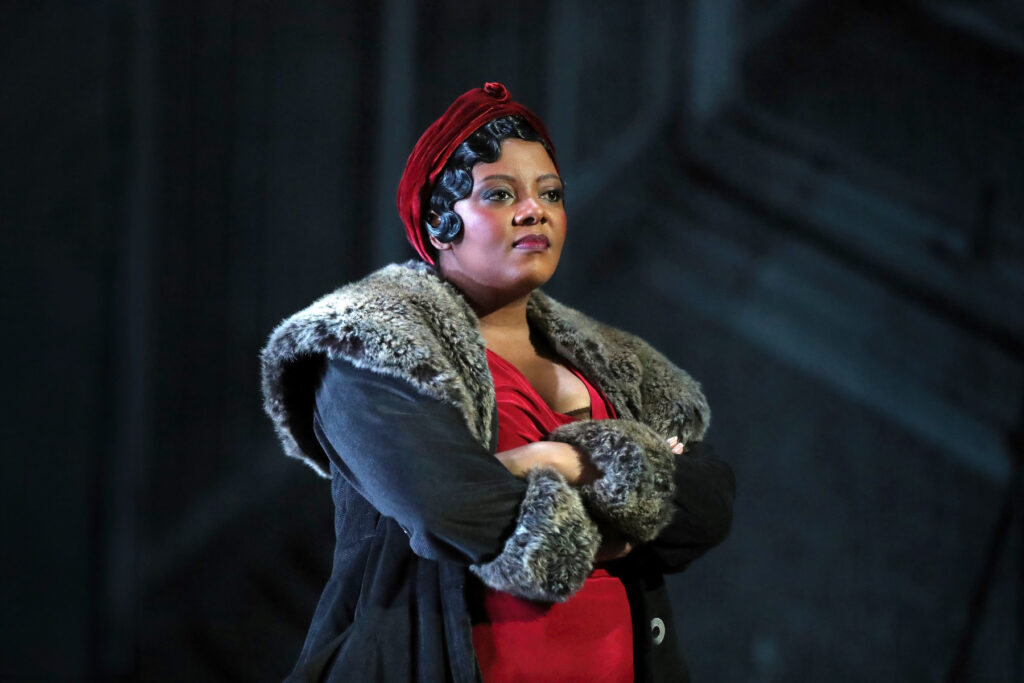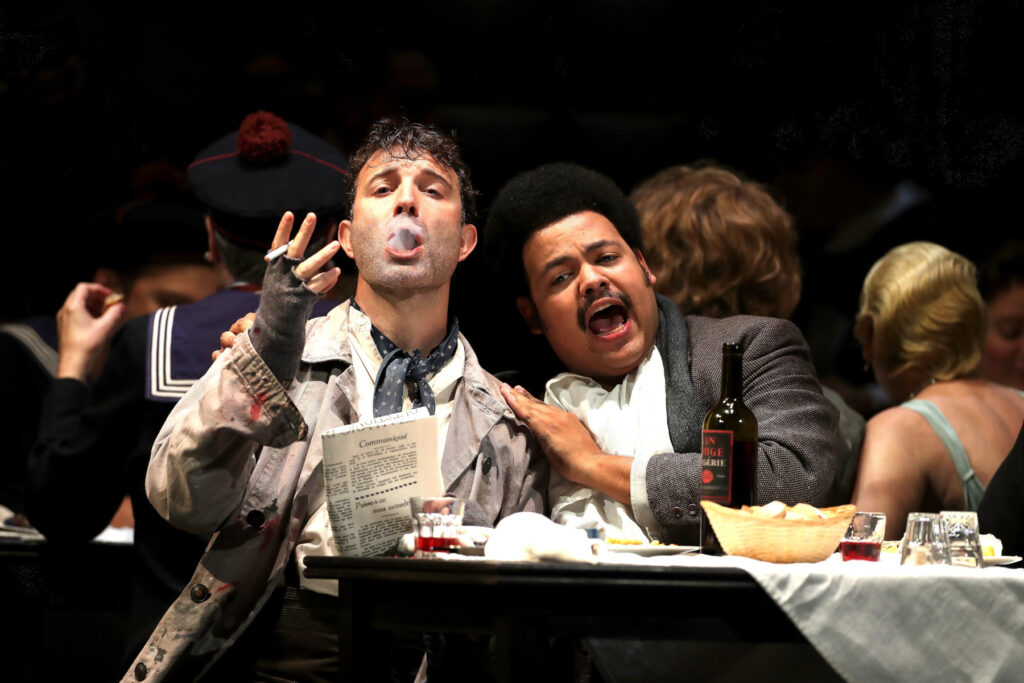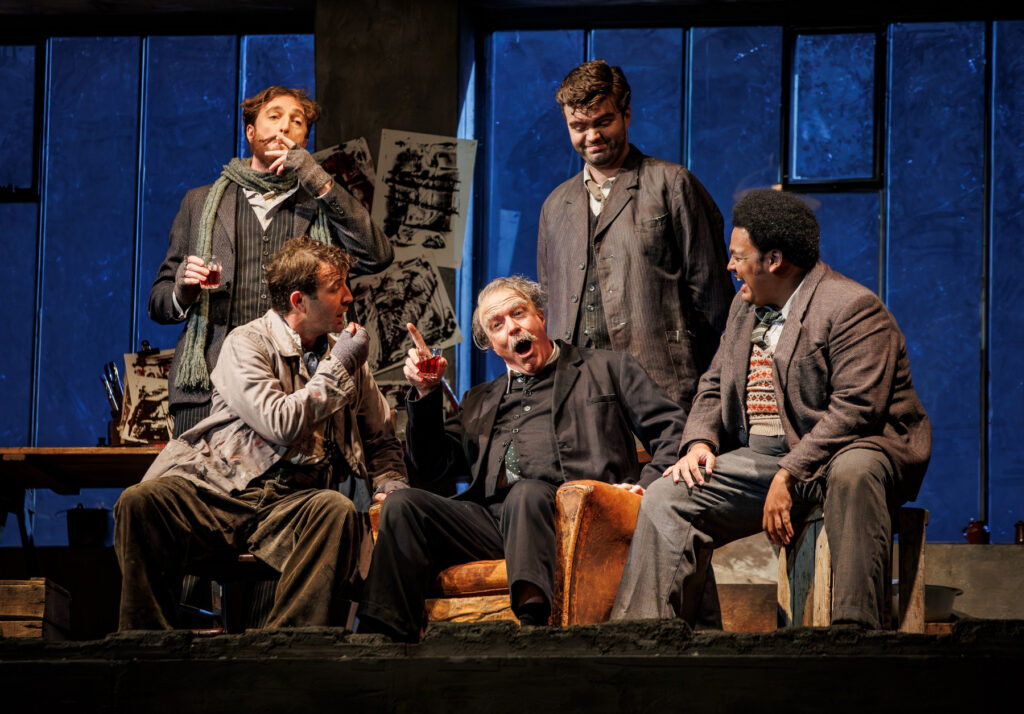Away from all the bright lights, the mesmerising world of show business, there’s another world: the world of the poor, the needy and the downtrodden. Who ever thought such a milieu could be the stuff of grand opera? Yet one of the most popular works in the repertory fulfils precisely that brief. Watching characters who don’t know where their next meal is going to come from turns out to be as riveting as peering into the salons of the rich and powerful.
For his original production of Puccini’s La bohème for English National Opera Jonathan Miller took his inspiration from the Parisian street photography of Henri Cartier-Bresson and Gyula Halasz (known as Brassaï). Those grainy black-and-white instances of mood painting are certainly reflected in ENO’s sets. They are uniformly gloomy and drained of colour, taking shabby chic one stage further. The artists’ garret, occupying the upper half of the stage for Acts 1 and 4, displays penury: little more than a bed, a trestle-table, a few chairs, and no coverings for the wide expanse of glass inviting in the cold. I did wonder at the conspicuously small collection of the painter Marcello’s charcoal sketches and the complete absence of books, a mainstay of poets like Rodolfo and scholar-philosophers like Colline. The grip that this penumbra exercises extends in Act 2 to the street outside Café Momus, providing little contrast between the introspective lives of the four artists depicted earlier and the hustle and bustle of urban activity. Muted colouring qualifies the costumes: Mimi wears a gunmetal-grey overcoat in Act 3 and a black dress with torn leggings in Act 4; Musetta has only a red rose in her hair in Act 2 to suggest her fiery nature and adopts a Josephine Baker-look in the final act, complete with short bob.

I was impressed by the revival director Crispin Lord’s attention to the way in which the leading characters interact, not least in the many tokens of friendship between the four artist friends. The only serious lapse comes in the final act when Colline and Schaunard stage a mock duel with baguettes, with crispy chunks of bread flying through the air. Those who are on the edge of starvation never treat food so casually. One striking detail is the degree of smoking. Nicotine as an appetite suppressant is given due prominence.
Madeline Boreham, winner of the second prize at the 2024 Kathleen Ferrier awards, replaced an indisposed Nadine Benjamin as Mimi, and did so very creditably. Making her house debut, she moved effortlessly through her registers, with only a slight tremulousness at the top, looking already frail and fragile at her first appearance, dignified and resigned at her end. She was especially affecting in Act 3, with falling snow intensifying the outer and inner cold, as she poured out her anguish to Marcello about Rodolfo’s treatment of her. Indeed, this act saw at its close some very fine singing with the two couples each locked into their private worlds of sadness, Marcello and Musetta at one end of the stage, Rodolfo and Mimi at the other.

Rodolfo’s three friends were well cast. Charles Rice’s warm baritone as Marcello matched the slightly more vibrant Patrick Alexander Keefe as Schaunard and the rock-steady security of Dingle Yandell as Colline. Vuvu Mpofu was an impressive Musetta in her ENO debut, making her seem in her feistiness and expression of will-power – “I will do whatever I fancy” – a close cousin to Carmen. In her major Act 2 aria, colloquially known as Musetta’s Waltz, she filled Café Momus and the auditorium beyond with the richness and brilliance of her voice. I also enjoyed Adam Sullivan’s brief vignette of Parpignol, his cycle loaded with trinkets and toys. Added sparkle came from the children’s chorus of St Joseph’s Catholic Primary School, whose boisterousness on stage was handled with considerable skill.
And what of Rodolfo himself? I was initially troubled by Joshua Blue’s low-key start, put slightly in the shade by a much stronger and more forthright Marcello. When he embraced Mimi’s icy hands in his important Act 1 aria, he was very much the dreamy, slightly shy poet, but all his top notes were there. He warmed up well too, as the performance progressed, and despite occasional moments of unevenness conveyed in Act 3 all the passion and sincerity of his love for Mimi, later capturing brief moments of ecstasy as he recalled the magic of their first meeting.

The performance was conducted by Clelia Cafiero, making her ENO and UK opera debut. In terms of pacing there was little to criticise; the elasticity of her pulse enabled her to savour moments of lyrical intensity, highlighting in particular the delicacies of Puccini’s orchestration, such as the interplay of harp, flutes and pizzicato strings at the outset of Act 3, while driving along the big ensemble pieces with an abundance of fervour.
Puccini, the centenary of whose death falls next month, once said that his success lay in putting “great sorrows into little souls”. For all their flaws, the characters in La bohème are lovable and seemingly normal, the kind most human beings have few problems in relating to. Moreover, in their youthful joie de vivre they remind audiences nostalgically of the joys and heady idealism of their own juvenescence . Even more obviously, in this opera there are no villains. And which of us wants to be thought of as one of the baddies?
Alexander Hall
La bohème
Opera in four acts with an original Italian libretto by Luigi Illica and Giuseppe Giacosa, based on Scènes de la vie de bohème by Henri Murger
Music by Giacomo Puccini
Sung in English with English surtitles
Co-production with Cincinnati Opera
Cast and production staff:
Mimi – Madeline Boreham; Rodolfo – Joshua Blue; Marcello – Charles Rice; Musetta – Vuvu Mpofu; Schaunard – Patrick Alexander Keefe; Colline – Dingle Yandell; Benoît – Paul Sheehan; Alcindoro – Andrew Tinkler; Parpignol – Adam Sullivan; Official – Robert Winslade Anderson; Policeman – Ronald Nairne
Director – Jonathan Miller; Revival Director – Crispin Lord; Set and Costume Designer – Isabella Bywater; Original Lighting Designer – Jean Kalman; Revival Lighting Designer – Marc Rosette; Translator – Amanda Holden; Children’s Chorus of St Joseph’s Catholic Primary School; Orchestra and Chorus of English National Opera; Clelia Cafiero – Conductor
London Coliseum, 3 October 2024
All photos © Lloyd Winters/ENO
Further performances until 19 October